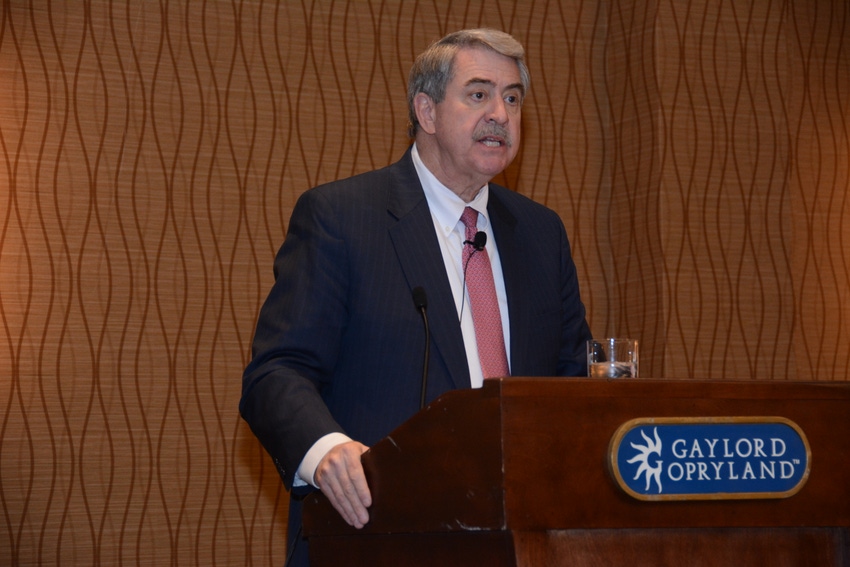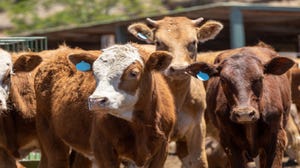USDA undersecretary for trade doesn’t mince words about what Canada needs to do to make NAFTA negotiations happen.

Think Sumo wrestlers circling. And circling. And circling. But not wrestling.
That’s the comparison Ted McKinney draws between the U.S. and Canada, as they discuss NAFTA from afar. Says McKinney, the USDA Undersecretary for Trade and Foreign Agricultural Affairs, “There may be too much circling and not enough engaging. But that time’s coming to an end.”
McKinney, an Indiana native who stresses his love for Canadian friends, says Mexico’s elections in March present a hard deadline for renegotiating NAFTA.
“I won’t dictate how to do negotiations but it’s time to land this ship and come to the table,” McKinney says.
He remains optimistic – yet realistic about what needs to happen.
“I am bullish we’ll get there because the three countries are too important to each other and somehow, some way, we have to come together,” McKinney says, adding that while NAFTA doesn’t need to be “blown up” by the Administration, it does need changes.
The elephant in the room is Class 7 Milk. In short, the U.S. exported ultra-filtrated milk to Canada, which was then re-exported around the world. Last year, Canada changed their milk classification, effectively eliminating the export market for that class of U.S. milk products.
“Class 7 Milk did it in. It exposed something that shouldn’t have been in existence 25 years ago,” McKinney says. “Every dairy organization known to man has written, phoned or been through my office, and that’s an itch that needs scratched.”
Canadian ag minister Lawrence MacAulay says Canada doesn’t want to dictate terms – “if we don’t get this, we won’t do that” – but says Canada fully supports supply management on dairy. Canada believes supply management has stabilized their dairy, egg and poultry industries.
“Everyone wants to take care of their ag sector and that’s what we want to do, too,” MacAulay says.
Picking and choosing?
Meanwhile, McKinney questions some Canadian tactics – and materials, pointing to a map they’ve circulated illustrating the benefits of U.S. and Canadian trade relationships, which includes re-exports.
“To my friends in Canada, you can’t include re-exports. That’s products that come here from around the world and get shipped to Canada. That’s disingenuous at best. So let’s call it what it is,” McKinney says.
Effectively, the U.S. has put its NAFTA issues on the table, and McKinney wants to sit down and negotiate.
He also pointed to the Canadian trade push during the 2018 American Farm Bureau Federation convention.
“I would also say to Canada, lovingly, as a friend, that if you put as much time into your negotiations as you have into a public affairs campaign – three ministers at AFBF – we might have NAFTA renegotiated,” he adds.
McKinney says farmers have to think differently about trade, particularly as a two-way street. “How can one win and one lose and still have a sustainable effort? But often times there are ways to trade and make all that possible. It’s not just exports – it’s a two-way street.”
Sen. Jerry Moran (R-Kan.) says farmers and ranchers have to “make certain the case is made on the importance of ag trade” whenever they have the opportunity.
He said he has made it known to the President and his cabinet that the benefits of the tax bill are greatly reduced to those in agriculture if there is no farm income, which could be a real possibility if the Administration withdraws from NAFTA.
Moran said the belief that withdrawing offers more leverage at the negotiating table is a “very high risk strategy” in his view.
He said the United States is taking a strong risk if they look elsewhere for supply. “Look at the TPP. It didn’t stop there from being an agreement when we withdrew. It became a situation where we are not part of the agreement.”
In the end, McKinney is abundantly clear on Canada. “We have more that binds us than separates us. But this negotiation is real.”
About the Author(s)
You May Also Like





